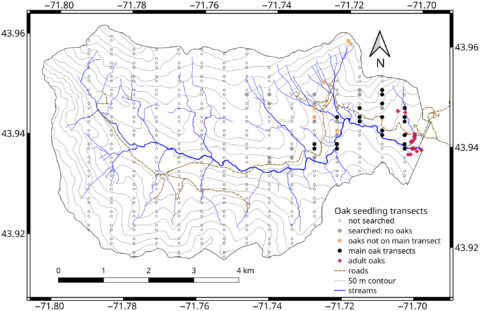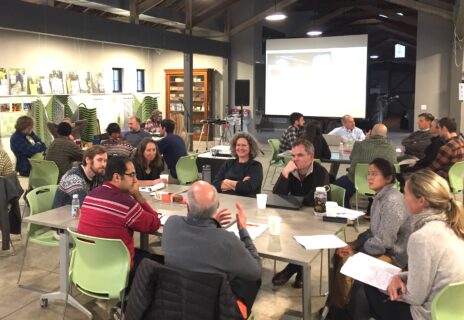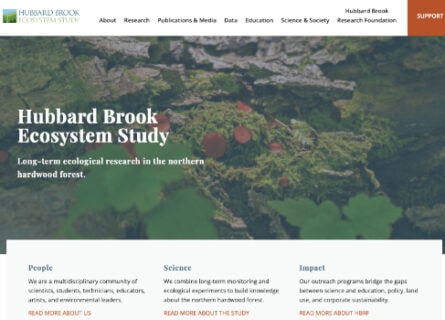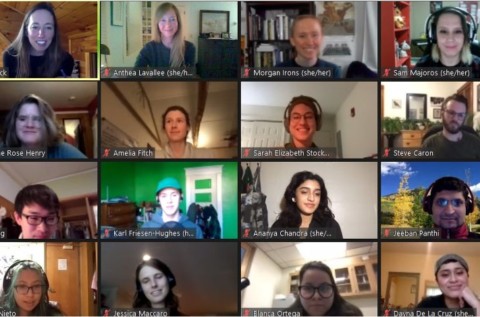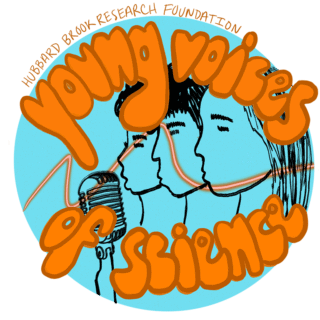Understanding how tree species adapt to changing environments is crucial as global change alters forest ecosystems. “Multi‐cohort survival of northern red oak seedlings at a northern hardwood forest transition“, published in August 2024, is a long-term study from Cornell University-based Natalie L. Cleavitt, et. al. focused on the northern red oak…
The just announced Climate Science Communication Internship, is a collaborative effort between Mount Washington Observatory (MWOBS), Appalachian Mountain Club (AMC), and Hubbard Brook Ecosystem Study. This will be an immersive 14-week experience for someone pursuing or holding degrees in meteorology, science communication, journalism, or related fields. “We’re looking for a…
Dramatic images from the U. S. Forest Service site manager of Hubbard Brook, Ian Halm. Halm shared these photos Saturday morning, following his night shift work on what’s called the Telephone Fire in Oregon. Halm was deployed from New Hampshire to Oregon as part of a 20 person handcrew…
“This session encourages contributions from diverse disciplines, including climate change’s impact on nutrient processing, engineered and nature-based nutrient control method assessments, stakeholder engagement, and implementation of conservation strategies at all spatial and temporal scales in any geographical setting.” Anthropogenic pressures and changing climate are profoundly impacting nutrient cycling, causing significant…
“We encourage submissions that highlight the effects of natural and anthropogenic disturbances on the biogeochemical cycling of elements along the terrestrial-aquatic continuum or within a single environment type (i.e., soil, water, or sediment).“ The urban terrestrial-aquatic continuum plays a critical role in global carbon and nutrient cycles, especially under novel…
The Hubbard Brook Ecosystem Study (HBES), established in 1963, is one of the longest-running ecological research programs in the world. Located in the White Mountains of New Hampshire, research conducted as part of HBES has significantly advanced our understanding of forest and stream ecosystems. In July of 2024 we sat…
On January 4-5, 2023, Hubbard Brook’s January Quarterly Project Meeting took place at Vassar College in Poughkeepsie, NY, and featured a series of talks on the selected topics of Critical Ecology and Changing Forest Structure. The first day’s talks and discussion introduced the topic of Critical Ecology, which is a…
Welcome to the new HubbardBrook.org website! The development of the new site was spearheaded by Mary Martin and Sarah Garlick to address our outdated platform and to improve the organization of our content. Many contributors worked on new content, particularly Clara Chaisson, Peter Groffman, and Raisa Kochmaruk. The team worked…
Call for Applications February 10, 2022 The Hubbard Brook Research Foundation is now accepting applications for the Young Voices of Science Program for the 2022 spring semester. The program is designed to provide participants with a launch pad for public engagement, early in their scientific careers. We prepare and empower science…
Young Voices of Science Spring 2021 Program Announcement – What: FREE science communication training and real world practice for science scholars! – Who: Graduate and undergraduate students in environmental fields are eligible to apply – When: Series of seven Zoom workshops held on Thursdays, March 11 through April 22, 6:00 – 7:30 pm ET – Where: Wherever…

